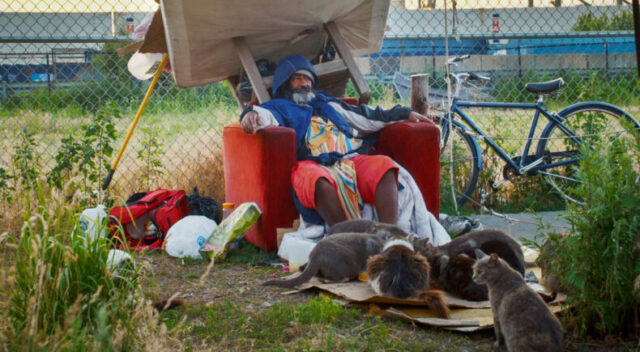
Documentary subject Eshete hunkers down in his makeshift Brooklyn home with his beloved cats
THE CAT MAN ESHETE (Laura Checkoway, 2025)
Brooklyn Film Festival
Windmill Studios
300 Kingsland Ave.
Wednesday, June 4, $18, 6:00
Festival runs May 30 – June 8
www.brooklynfilmfestival.org
“I admire myself for surviving all this,” Eshete says as he rides his bike over the Brooklyn Bridge at the end of Oscar winner Laura Checkoway’s sweet-natured, gently moving documentary The Cat Man Eshete, making its Brooklyn premiere June 4 at the Brooklyn Film Festival.
Eshete, which means harvest, was born and raised in Gondar, Ethiopia, in August 1960, part of a large and happy family. Following the overthrow of Emperor Haile Selassie in 1974, he became a member of the underground Ethiopian Revolutionary Party but had to flee after being tortured. He spent five years in a refugee camp in Sudan before arriving in America. Trying to build a life for himself, he suffered a construction accident that put him on disability for twenty years, until his structured settlement ran out. He’s been living outside ever since, in a small spot on the side of a street, in front of a chainlink fence; behind the fence is an industrial area on the East River, with views of Lower Manhattan and the Statue of Liberty.
“Homeless bum, that’s how they see me,” he says. “They don’t know what I’ve been through.”
But Eshete is not looking for sympathy or handouts; he seems to be okay existing how he does, surrounded by his beloved cats, which he has been taking care of for more than a dozen years.
His grizzled face and childlike eyes are nearly hidden by his overgrown, unkempt gray, white, and black beard and mustache. He sits and sleeps on a ratty red armchair with cardboard on which he has scrawled a manifesto about “racist madness.” His friends Robert and Diane, who live in the apartment building Eshete was evicted from, have been feeding him for two decades. People from the neighborhood stop by and say hello, wishing him well.
But all that matters to him are his kitties.
“I have tremendous love for them. So deep, you know?” he explains. “My cats are everything.”
His created family consists of Horizon, Gorgeous, George Washington, Doodles, Junior, Frank Sinatra, Jesse Jackson, Winston Churchill, Castro, Patrice Lumumba, Princess Diana, Albert Einstein, Oprah, Squirt, Nubia, Sheba, Piggy, Animation, Dragon Lady, Ms. Ethiopia the Rocket Girl, Damascus, and Rico. He has a fraught relationship with Jeneane, a married woman who likes to feed the cats and talk to them, but Eshete thinks she is only bothering them; it might be jealousy, as the cats are more than just stray animals to Eshete.
As the twenty-six-minute documentary continues, Eshete delves into grief and loss, mentions the plans he had for himself and his relatives. But those dreams turned into nightmares, as memories of home flood his mind.
“It look like heaven, like a fairy-tale land,” he remembers as shots of Gondar, taken by director of photography Greg Harriott, appear onscreen.
The story also resonates as the current administration seeks to deport legal and illegal immigrants and cuts the budgets for homeless services.
But none of that concerns Eshete, who admits, “I am a traumatized person. I don’t like medication, though. My grief — I listen to music, I love nature. You know, the cats . . . Cats are great. Out of darkness give you light.”
The Cat Man Eshete is screening at Windmill Studios on June 4 at 6:00 in the “Protecting the Family” section of the festival, along with Chris Peters’s It’s Expensive to Be Poor, Nicholas Stachurski’s Land of Lost Toys, and Jesse Samos Leaman and Maite Martin Samos’s Mother of Chooks.
In addition, it will begin streaming June 16 on the Al Jazeera English series Witness in conjunction with World Refugee Day, June 20.
[Mark Rifkin is a Brooklyn-born, Manhattan-based writer and editor; you can follow him on Substack here.]